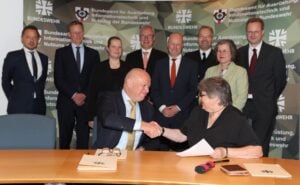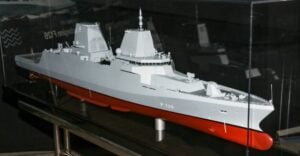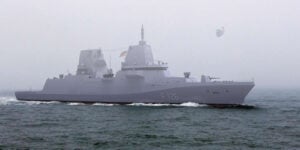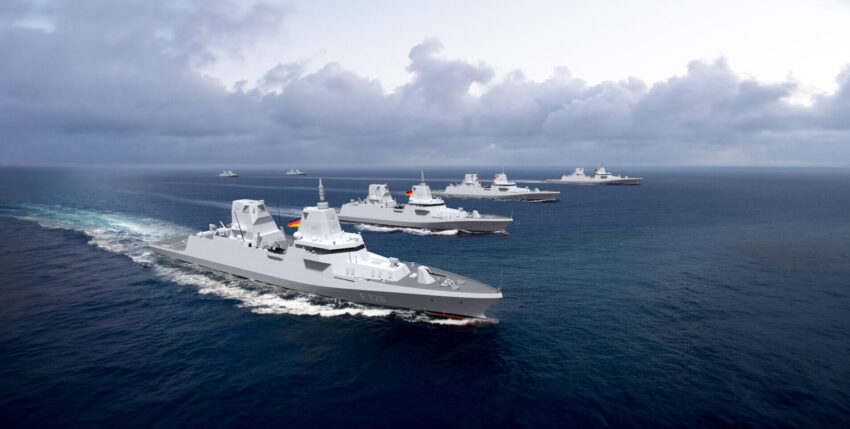The good news is that the contractually agreed option for two more ships can be exercised following the decision of the German Bundestag's Budget Committee on 12 June.
On 19 June 2024 - exactly four years after the construction contract for the first batch was signed - the contract for the second batch of two F 126 ships was signed in Koblenz at the Federal Office of Bundeswehr Equipment, Information Technology and In-Service Support (BAAINBw).

The construction contract signed on 19 June 2020 provided for the procurement of four units. The construction of two further units would be possible via an option to be exercised within two years. Hopes for a quick decision to honour the option that arose in connection with the establishment of the Bundeswehr Special Fund have so far remained unfulfilled, partly due to the structure of the special fund within the federal budget.
The decision taken shortly before the deadline means that the conceptual requirement can be met. In the Navy 2035 course originally published as a target picture, the Navy inspector puts the requirement at six F 126 units, based on NATO's defence planning goals and the rhythm of the Navy's deployments, training and maintenance phases. According to available information, NATO has a planning target of 15 frigates for Germany. Ship 5 is to be delivered in January 2033 and ship 6 in January 2034.

Financing
The total financial requirements of the option exercise project amount to 3.18 billion euros, of which the contract value is rounded to 2.88 billion euros. The difference results from provisions, other services and a provision for the unforeseeable - all based on prices as at 12/2023. In addition to the ships, the total sum includes an ASW situation picture mission module and a custody mission module.
At the time the contract was signed, 5.72 billion euros, including the mission modules, were included in the federal budget for four MKS 180s, as the F 126 was still known at the time. A rough estimate of 1.43 billion euros per ship. This compares with 1.59 billion euros for ships 5+6.
Inflation as a result of the coronavirus pandemic and the war in Ukraine is cited as the reason for the price escalation declared in the amendment agreement, which was approved by the Budget Committee.
The Budget Committee's approval of the amendment agreement was linked to the condition that the higher income of the main contractor resulting from the price increase be passed on to the German subcontractors.
In this context, it should be noted that Damen Schelde Naval Shipbuilding is the general contractor for the F 126 project. One hundred per cent of the production is being carried out in Germany together with the German NVL Group. The sterns will be built at the Peene shipyard in Wolgast, while the forecastles will be manufactured in Kiel and assembled with the sterns there. The ships are then shipped to Hamburg for final outfitting, commissioning and testing.
According to the BMVg, the aim is for around 70 per cent of the added value for the project to be created in Germany, which means that over 65 German contractors will be involved in the construction of the ships. In earlier announcements by the Koblenz Procurement Office, the value added in Germany was still put at 80 per cent.

Tricky budget management
Contrary to what is often reported in the media, the two 'option units' were already taken into account by the Federal Government in the government draft for 2024, which received parliamentary approval towards the end of 2023. This is because they were budgeted as commitment appropriations directly in the defence budget (Section 14) and not in the special Bundeswehr assets. This is due to be used up by the end of 2027. However, the financial planning time horizon for Ships 5+6 extends to 2035 and must therefore also be secured beyond the term of the special fund.
The only thing to criticise is that no corresponding budget provision was made in the current 2025-27 financial plan. However, this has been common practice in phases of changing legislatures. In our view, the 'ceiling-neutral' provision of budget funds for ships 5+6 represents a risk in that it could have a displacement effect on other projects. For example, on the Lithuania brigade. However, in response to our enquiry during the press conference on the sidelines of the keel laying ceremony for the frigate "Niedersachsen" in Wolgast, Federal Defence Minister Boris Pistorius rejected this.
The parliamentary opposition sees this as an expression of the Bundeswehr's underfunding. Ingo Gädechens, rapporteur of the CDU/CSU parliamentary group for the defence budget: "The Bundeswehr continues to operate in a mode of financial mismanagement. His press release issued on the occasion of the Budget Committee's decision on 12 June ends with:
"As good as today is for the navy, a closer look at the details unfortunately reveals a different overall picture. Unfortunately, the turning point is increasingly becoming the end of the era, especially with regard to the Bundeswehr's finances. If the traffic lights and the Federal Chancellor carry on like this, the order for further F126 frigates will be one of the last pieces of good news before the procurement disaster - which has already been announced by Boris Pistorius himself."










